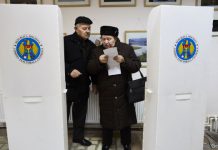CHIȘINĂU (Imedia) și Moscow will continue providing humanitarian aid to Transnistria throughout this entire year, said Russian M.P. Vladimir Medinski during a visit to Tiraspol. Mr. Medinski is part of the ruling Edinnaia Rossia [Imedia: United Russia] party’s general council.
The Russian official added that aid is intended for a hike in pensions, meals for children in kindergartens and schools, as well as a series of preferential credits for agricultural projects. Mr. Medinski did not specify an exact sum, but stressed that in 2009 Transnistrian retirees will receive pensions that are 50 percent larger than in 2008. „Last year our help was mostly determined by the drought. But it seems like this single episode of help is already turning into a program. Considering that the Transnistrian Moldovan Republichas managed to develop an efficient control mechanism for fund distribution, we have decided to provide humanitarian help this year, as well. The fact that we are helping in the context of a world crisis shows the fact that this is purely brotherly, not economic or political, assistance,” emphasized Medinski. Chisinau authorities have not commented on Russia’s intentions.
Commentary:
Evgheni Sevciuk: Russia‘s help proves the country’s „responsibility and consistency”.
Evgheni Sevciuk, President of the Transnistrian Supreme Soviet [Imedia: Parliament], says that Russia‘s help proves its „responsibility and consistency /…/ in terms of the problems of defending and supporting its nationals /…/, no matter where they live.” Mr. Sevciuk added that, in the last few years, Russia has provided help to the less fortunate in Transnistria without consideration for citizenship, which proves „a high degree of humanism.” „It is important for the people to know that in these complicated times they can use the help that the Russian Federation has provided,” emphasized the Speaker. Mr. Sevciuk announced that he would visit Russia next week to discuss „technical problems” about the help promised to Tiraspol.
Nicu Popescu : Russian assistance is crucial for Transnistria’s survival
Nicu Popescu, a researcher with the London-based European Council for Foreign Relations (ECFR), says that Russian assistance to Transnistria for this year „is but a continuation of a longer policy that has been more or less typical for the last 18-19 years. Throughout this period, Moscow has been the main supporter of the region when it comes to direct economic assistance and various subsidies.” „This help is very important for Tiraspol because in the last two years Transnistria has been facing severe budgetary problems that have worsened with the onset of the world economic crisis. Exports from the Ribnita Steel Plant, which make about 50 percent of the region’s budget, have halved. As a result, Russian help is crucial to keep Transnistria ‘above water’,” adds the analyst. Mr Popescu told Imedia that „although Russia says it is ready to pressure Transnistria, Moscow actually has a strategic interest in the region, and this foreign policy will continue in the future.”
Vladislav Kulminski: It is clear that without external aid, the region could suffocate
Vladislav Kulminski, seniour expert with the Foreign Policy Association (APE), says that „it is clear that without external aid, the region could suffocate and face social unrest.” „It could therefore be expected that Russia would ultimately provide some form of aid to Transnistria, if only to strengthen its strategic influence in the region and prevent others from stepping in and offering more attractive bail-out packages,” adds Mr. Kulminski. „Finally, the crisis will hurt Transnistria more than it will hurt Moldova and it may make some Transnistrian politicians somewhat more pragmatic. The question is whether Moldova and the European Union would be able to seize this window of opportunity and extend a hand to the region,” concludes the expert.
The Kremlin decided to provide humanitarian help to Transnistria after the region’s Supreme Soviet made a request on December 19, 2008, to Russian President Dmitri Medvedev, Prime Minister Vladimir Putin, and the State Duma. Currently, the average pension in Transnistria reaches 313 local roubles (36 U.S. dollars), which only covers 39 percent of the minimum necessary for subsistence in the region. According to data from the latest census in 2004, the breakaway republic has 134,500 retirees out of a total of 555,000 inhabitants. Transnistria received a similar help package from Russia in 2008, worth about 27 million dollars. Moscow media outlets wrote two years ago that Russia had decided to cease financial assistance
to Transnistria because the Kremlin was allegedly disappointed with the way Igor Smirnov, the region’s leader, had managed the funds. The decision to continue assistance was made as a result of a visit by Evgheni Sevciuk in Moscowin 2007, when he signed a cooperation agreement with the pro-Kremlin Edinnaia Rossia Party. The Tiraspol administration began dealing with financial problems toward the end of 2005 and beginning of 2006, once the European Union Border Assistance Mission to Moldova and Ukraine (EUBAM) was initiated and once a new customs regime was established. The new rules said that Transnistria could no longer export its products to or via Ukraine without Chisinau’s prior approval. President Vladimir Voronin has repeatedly stated that the Tiraspol regime has managed to survive throughout all of these years because of illegal revenue worth two billion dollars collected from trading in contraband goods at the border with Ukraine, and that the EUBAM stopped that.
Profile:
Evgheni Sevciuk is currently president of the Supreme Soviet in Tiraspol. He was born on June 19, 1968 in Ribnita, a town in Transnistria. Mr. Sevciuk has a law degree from the State University of Transnistria and a mechanics degree from the Agricultural University of Ukraine. He has also taken graduate courses in Moscow and Kiev. Between 1992 and 1998, he worked for the Transnistrian police, and eventually worked his way up to head of Tiraspol’s financial police. Mr. Sevciuk then went into the private sector, and was elected to the Supreme Soviet in 2000. In 2005, he was reelected on the lists of the Obnovlenie[Renewal] Party and was appointed Supreme Soviet president. Experts believe he promotes the interests of businesspeople in the region.
Nicu Popescu is a researcher with the London-based European Council on Foreign Relations. His areas of expertise include European neighborhood policies, post-Soviet conflicts, relations between the EU and Russia, Moldova, and the South Caucasus. Mr. Popescu is finishing his doctorate from the Central European University in Budapest, Hungary. He is fluent in English, French, Russian, and Romanian. Mr. Popescu has a personal blog, and has recently started another one specifically dedicated to the April 5 parliamentary elections in Moldova.
Vladislav Kulminski is an expert with the Chisinau-based Foreign Policy Association (APE). He has taken courses in politics and economics at the State Department of the U.S. and holds an M.A. in international relations and European studies from the Central European University in Budapest, Hungary. Mr. Kulminski has previously worked for the Infotag news agency and for the American Embassy in Moldova (2004-2008). Aside from his work for APE, he is also a consultant for the British Embassy in Chisinau.






